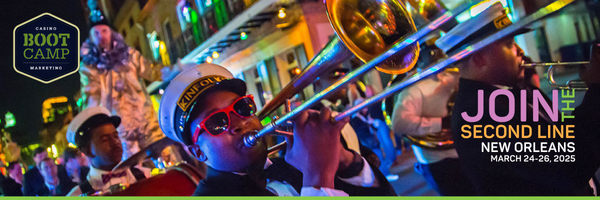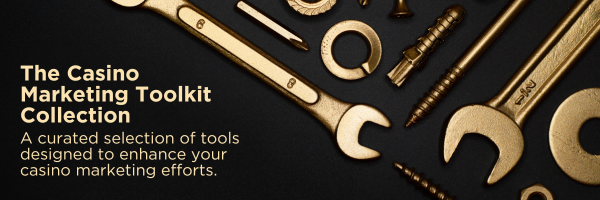Did you know that over 60% of casino patrons actively seek personalized experiences?
A well-trained marketing team is more than an asset. It’s the key to unlocking customer loyalty, driving revenue growth, and outperforming the competition.
As customer preferences evolve and marketing tools become more sophisticated, ensuring your team has the right skills and strategies is critical for success. Casino marketers face a unique set of challenges. From navigating the complexities of player segmentation to harnessing the power of data analytics, staying ahead of the curve requires constant adaptation and upskilling. By investing in your team’s development, you can overcome these challenges and reap the rewards of a high-performing marketing department.
A well-trained team can effectively target your ideal customers, optimize your marketing spend, and build lasting relationships that translate into increased revenue and brand loyalty.
But how do you ensure your team has the skills and strategies to succeed?
Build a Strategic Foundation
A clear marketing strategy is the cornerstone of practical training and successful execution. Without it, your team risks working in silos or pursuing unfocused initiatives, leading to fragmented efforts and diluted results. Establishing a strategic framework gives your team the direction, focus, and alignment needed to achieve measurable and impactful outcomes.
A well-defined strategy outlines the “what” and clarifies the “why” and “how,” empowering your team to make informed decisions that support your overall business objectives.
Action Steps:
- Set SMART Goals
Equip your team with the tools to define and execute Specific, Measurable, Achievable, Relevant, and Time-bound (SMART) goals. Training your team to use this framework ensures clarity and accountability, making measuring success and refining approaches easier.
Example: Replace vague goals like “increase website traffic” with focused objectives such as “increase website traffic from social media by 15% over the next quarter.”
Team Exercise: Encourage team members to workshop SMART goals for a live campaign, promoting collaboration and shared ownership of objectives.
- Develop a Brand Ladder
Introduce your team to a brand ladder, a visual framework that organizes your brand’s attributes, benefits, and values into a cohesive structure. A brand ladder ensures consistent messaging and marketing decisions that resonate with your audience.
Why It Matters: A brand ladder clarifies what your brand stands for at every level, from functional benefits (e.g., convenience) to emotional benefits (e.g., excitement or belonging). It helps ensure all marketing activities align with your brand identity.
Implementation Tip: Use a brand ladder template to guide your team in defining your brand’s core aspects.
Investing in a strong strategic foundation ensures that your team is aligned, goal-oriented, and equipped to make every campaign a success. It’s not just about what they do—it’s about why and how they do it better than the competition.
Understand Your Audience Through Personas
Casino customers are a diverse group with unique motivations, preferences, and behaviors. From high-worth customers seeking VIP treatment to casual visitors enjoying a night out, understanding these distinct customer types is crucial for delivering tailored experiences. Equipping your team to recognize and respond to these nuances will ensure your marketing campaigns are targeted and impactful, leading to higher engagement and ROI.
Understanding personas goes beyond demographics to uncovering what drives each customer segment to visit your casino and how to meet their needs effectively.
Action Steps:
- Create Detailed Personas
Develop comprehensive profiles for key customer segments, such as high-rollers, slot enthusiasts, casual diners, and event attendees. These personas should include demographic information, behavioral patterns, motivations, and pain points to inform your marketing efforts further and are not limited to the following.
- High-Worth Customers: VIPs who value exclusivity and personalized experiences.
- Slot Enthusiasts: Frequent visitors motivated by promotions and rewards.
- Casual Diners: Guests who come for dining experiences but might be upsold on gaming or events.
- Event Attendees: Visitors drawn to concerts, shows, or other events, often with a secondary interest in gaming.
- Scenario-Based Learning
Use real-world scenarios to train your team to cater to different customer needs and to help your team apply personal knowledge in practical situations. For example, how would you craft a personalized offer for a VIP who enjoys table games versus a frequent visitor who primarily plays slots on every visit? For example:
- VIP Scenario: Craft an exclusive offer combining complimentary accommodations and a private gaming table for a high-spending table games enthusiast.
- Slot Enthusiast Scenario: Develop a campaign promoting double loyalty points on slot play during midweek evenings.
- Team Exercise: Create role-play exercises where team members respond to customer profiles, refining their ability to connect with and upsell various personas.
By training your team to understand and apply personas effectively, you’ll transform your campaigns into personalized, customer-centric experiences that resonate with your audience.
Embrace Digital Tools and Trends
Today, leveraging online marketing channels is essential for staying competitive. From social media and email marketing to search engine optimization (SEO) and analytics, digital tools enable you to connect with your audience where they spend their time. With the global online gambling market expected to reach $102.97 billion by 2025, embracing digital strategies is critical for growth in the casino industry. Your team needs to be proficient in today’s digital tools as well as tomorrow’s.
By training your team to master digital platforms, you ensure your casino stays top of mind while driving measurable results.
H3: Action Steps:
- Master Digital Communication
Equip your team to use digital communication channels effectively:
- Social Media: Teach them to create engaging content for Facebook, Instagram, TikTok, and other platforms. Run targeted ads to reach specific demographics, such as Millennials or high-worth gamers.
- Email Marketing: Train your team to craft compelling newsletters with personalized offers, event updates, and promotions that encourage repeat visits.
- SEO Strategies: Optimize your website for search engines to improve visibility. For example, ensure your casino appears in searches for “best casinos near [city].”
- Quick Win: Start small by focusing on one or two high-impact platforms, such as Instagram for visual engagement or email for direct communication.
- Explore Analytics
Empower your team with the tools and knowledge to track performance and adjust strategies in real time. Analytics provide critical insights into what works and what doesn’t, enabling more intelligent decision-making across campaigns, events, and promotions.
- Pro- and Post-Formas: Teach your team to prepare and analyze pro- and post-forma reports for events, promotions, and offers.
- Pro-Forma: Ensure staff can forecast expected costs, revenues, and ROI for upcoming events or campaigns, allowing for realistic goal-setting and budget alignment.
- Post-Forma: Train your team to review actual performance data after execution to compare against forecasts, identify successes, and highlight areas for improvement. For example, analyze attendance versus spend for a high-profile concert to refine future event planning.
- Google Analytics: Monitor website traffic, bounce rates, and conversion paths to optimize digital campaigns.
- Social Media Analytics: Use platform dashboards to measure engagement, impressions, and follower growth, helping refine content strategies.
- SMS and Email Marketing Metrics: Track open rates, click-through rates, and campaign ROI to evaluate effectiveness and refine future campaigns.
Create a Centralized Analytics Process: Use tools like dashboards or spreadsheets to integrate data from all campaigns, promotions, and events. Providing a single source of truth enables your team to track trends and improve both short-term results and long-term strategies.
By equipping your team with the skills to embrace digital tools and trends, you future-proof your casino’s marketing efforts and position your brand for sustainable growth.
Focus on Personalized Customer Connections
While consumers increasingly engage through digital channels, they still crave personalized experiences that make them feel valued and understood. Delivering personalized interactions—both online and offline—is critical to building loyalty and advocacy.
A Forrester study revealed that 77% of consumers have chosen, recommended, or paid more for a brand that provides a personalized service or experience. However, many customers find current personalization efforts underwhelming, making this a key area for differentiation.
Action Steps:
- Host Engagement Training
Empower your team with customer service techniques that go beyond the transactional:
- Learn the Basics of Personalization: Train staff to use customer names, remember preferences (e.g., favorite games or drinks), and make tailored recommendations.
- Proactive Service: Teach your team to anticipate and address customer needs before they arise. For example, a host noticing a regular player arriving at the buffet might proactively reserve their favorite table.
- Team Exercise: Role-play scenarios where staff practice personalizing interactions with high-value guests and first-time visitors.
- Customer Journey Mapping
Train your team to identify and enhance touchpoints across the entire customer journey:
- Pre-Visit: Optimize awareness and onboarding efforts, such as welcome offers or email campaigns for new members.
- On-Site: Enhance the in-person experience with personalized greetings and host engagement.
- Post-Visit: Follow up with tailored offers or surveys that acknowledge the customer’s unique experience.
- Pro Tip: Use a visual tool like a customer journey map to help your team understand these stages. (Include an image of a sample customer journey map for clarity.)
Casino hosts trained in personalization techniques are significantly more likely to convert satisfied guests into loyal advocates. These advocates return and recommend your casino to others, amplifying your reach and impact.
Make Data-Driven Decisions
Data is the goldmine your marketing team needs to drive more intelligent, effective campaigns. By training your team to collect, interpret, and act on data insights, you empower them to make decisions that deliver measurable results and align with your business objectives.
Action Steps:
- Implement Data Workshops
Host workshops to train your team on:
- CRM Systems: Teach them to use platforms like Salesforce to track and manage customer interactions.
- Actionable Insights: Show how to extract meaningful insights from analytics dashboards (e.g., Google Analytics, loyalty program data).
- Event Analysis: Equip them to analyze pro- and post-forma reports for promotions, events, and offers.
- Pro-Forma: Train your team to forecast expected costs, revenues, and ROI before a campaign or event.
- Post-Forma: Help them compare actual outcomes against projections to refine future strategies.
- Define Key Metrics
Focus your training on the KPIs that matter most:
- Average Daily Theoretical (ADT): Monitor player value to optimize reinvestment.
- Reinvestment ROI: Ensure your offers and promotions yield a strong return.
- Customer Lifetime Value (CLV): Train your team to calculate and maximize this metric for sustained growth.
- Campaign Effectiveness: Measure the performance of marketing initiatives across all channels.
Combine data insights with customer feedback to refine campaigns and deliver truly personalized, high-impact marketing strategies.
Cultivate Collaboration and Innovation
A thriving marketing team is built on a foundation of collaboration and creativity. Encourage open communication, idea sharing, and a culture where everyone feels empowered to contribute. Fostering a collaborative and innovative environment leads to higher-quality campaigns and builds a stronger, more versatile, and more engaged team.
Action Steps:
- Host Creative Sessions
Organize regular brainstorming sessions to generate innovative campaign ideas. Encourage your team to think creatively, experiment with new approaches, and challenge the status quo.
- Generate Ideas: Encourage team members to pitch unique promotional concepts or engagement strategies.
- Experiment Boldly: Foster a culture where testing unconventional ideas is safe.
- Collaborate Across Teams: Involve operations, food and beverage, and entertainment teams for cross-functional innovation.
- Team Exercise: Divide into small groups to create a marketing campaign from scratch, emphasizing creativity and collaboration.
- Rotate Roles
Cross-training your team in different functions can:
- Build empathy and understanding of the broader marketing process.
- Encourage collaboration by showing how each role contributes to overall success.
- Develop a versatile team that can adapt to changes or fill in when needed.
Collaborative efforts lead to improved morale, increased productivity, and a more dynamic team environment, ensuring long-term success.
Adapt to Generational Shifts
Each generation, from Baby Boomers to Gen Z, has distinct preferences and expectations. Your team must adapt messaging and marketing channels to engage effectively and resonate with these unique demographics. Training your team on generational insights ensures your campaigns are relevant, targeted, and appealing.
Action Steps:
- Generational Insights Training
Educate your team on the distinct characteristics of each generation, including their preferred communication channels, values, and motivations.
- Baby Boomers: Prefer traditional marketing like direct mail and respond well to nostalgia-driven campaigns.
- Gen X: Value practical promotions and convenience; a direct mail and digital blend works well.
- Millennials and Gen Z: Engage more through digital channels like social media, influencers, and video content while leveraging trends
- Omni-Channel Strategies
Explain how to integrate traditional and digital channels to reach all customer segments. Implement omnichannel marketing strategies that combine traditional channels like direct mail with digital platforms like social media and email marketing to reach all customer segments.
- Direct Mail + Digital: Send promotional mailers with QR codes linking to exclusive online offers.
- Social Media + On-Site: Use Instagram to promote in-casino events, then track engagement on-site.
- Cross-Platform Retargeting: Combine email campaigns with targeted social ads to nurture potential guests.
Generational training equips your team to craft messaging that resonates across demographics, ensuring a seamless experience for all customers.
Tie Training to Business Impact
Training your marketing team should not be an isolated effort. It’s an investment that directly contributes to your casino’s measurable success. By linking training programs to specific business objectives, you ensure that every session, workshop, or tool introduced has a clear purpose and delivers tangible results.
Whether it’s increasing customer retention, improving loyalty, or driving revenue, tying training to outcomes ensures your team stays focused on initiatives that matter most to your bottom line.
Measuring Training Effectiveness
The actual value of training lies in its results. Establish a system for tracking and evaluating how training initiatives impact team performance and overall business objectives. This requires defining relevant metrics, collecting feedback, and making ongoing adjustments to maximize effectiveness.
Action Steps
- Link Training to KPIs
Define Key Performance Indicators (KPIs) that directly reflect team performance and desired business outcomes. These metrics help evaluate the success of your training programs and provide clear targets for your team to aim for.
Examples of KPIs:
- Customer Engagement: Track metrics like website traffic, click-through rates, and time spent on key pages.
- Conversion Rates: Measure how well your campaigns convert visitors into players or event attendees.
- Loyalty Metrics: Monitor repeat visits, loyalty program sign-ups, and average spend per customer.
- Customer Satisfaction Scores (CSAT): Use post-visit surveys to gauge how well your team’s efforts resonate with guests.
- Reinvestment ROI: Evaluate whether your marketing spend is yielding optimal returns based on player value.
Team Exercise: Host a workshop where participants link their daily responsibilities to specific KPIs, building awareness of how individual efforts contribute to broader goals.
- Refine Through Feedback
Continuously assess the effectiveness of your training programs by gathering insights from participants and reviewing performance metrics. Feedback loops ensure your training evolves to meet team needs and business objectives.
Steps for Gathering Feedback:
- Post-Training Surveys: Ask participants to rate the training content’s relevance, clarity, and applicability.
- Performance Reviews: Compare individual or team performance before and after the training.
- Observation and Discussion: Post-training, schedule one-on-one or team discussions to identify challenges and successes.
- Iterative Improvement: Use the feedback to refine training materials, introduce new modules, or adjust delivery methods. For example, if a module on CRM tools receives low engagement, consider adding hands-on simulations or real-life case studies.
- Integrate cost-benefit analysis into your training evaluation to determine ROI. For example:
- Cost: Total expenses for the training session, including materials, tools, and time.
- Benefit: Revenue growth, operational efficiencies, or reduced customer churn attributed to the training.
By tying training to measurable outcomes and refining programs based on feedback, you transform learning initiatives from a routine activity into a strategic driver of business success. When your team sees the connection between their efforts and tangible results, they’re more likely to engage, perform, and deliver exceptional outcomes for your casino.
Empower Your Casino Marketing Team for Success
Your marketing team is your greatest competitive advantage. Investing in their training and development will enhance their skills and build a foundation for sustained growth, deeper customer connections, and long-term loyalty.
With the right tools and strategies, your team can transform challenges into opportunities, turning every campaign into a success story and every customer into an advocate. Your team is the key to your casino’s future success.
Ready to take the next step? Equip your team with the resources and training they need to excel. Whether it’s mastering new technologies, refining customer interactions, or driving measurable results, the journey begins today. Let’s make it happen.
Key Takeaways:
- A strong marketing strategy provides the “why” and “how” to guide your team toward measurable goals.
- Customer personas and tailored marketing ensure that campaigns resonate with distinct audience segments.
- Mastering digital tools and analytics future-proofs your marketing efforts and optimizes results.
- Collaboration, innovation, and generational insights keep your team agile and engaged.
- Linking training to business outcomes ensures that every initiative contributes to your bottom line.






Recent Comments